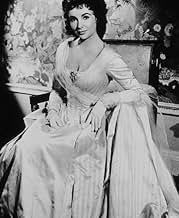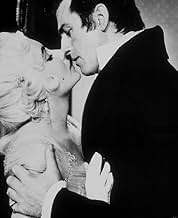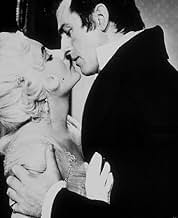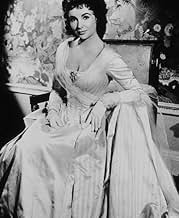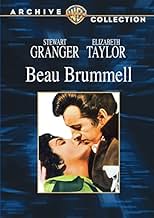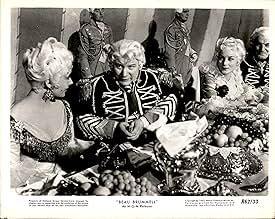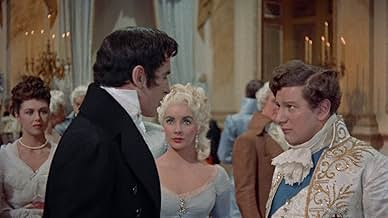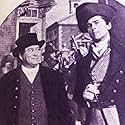Agrega una trama en tu idiomaIn 1796, Captain George Bryan "Beau" Brummell of the 10th Royal Hussars Regiment offends the Prince of Wales with his straightforward outspokenness and gets fired from the Army but is chosen... Leer todoIn 1796, Captain George Bryan "Beau" Brummell of the 10th Royal Hussars Regiment offends the Prince of Wales with his straightforward outspokenness and gets fired from the Army but is chosen as the Prince's personal advisor.In 1796, Captain George Bryan "Beau" Brummell of the 10th Royal Hussars Regiment offends the Prince of Wales with his straightforward outspokenness and gets fired from the Army but is chosen as the Prince's personal advisor.
- Dirección
- Guionistas
- Elenco
- Dirección
- Guionistas
- Todo el elenco y el equipo
- Producción, taquilla y más en IMDbPro
Opiniones destacadas
The film is far from being historically accurate, especially as regards chronology. The events depicted here (the Regency Crisis of 1788, the Prince's marriage to Caroline of Brunswick, Brummell's rise in the Prince's favour, his fall from grace, the death of King George III in 1820 and Brummel's own death in 1840) historically cover a period in excess of fifty years, but here they are presented as occurring over a much shorter timescale. Rather oddly, the villain of the piece is William Pitt the Younger, widely regarded as one of Britain's greatest Prime Ministers but presented here as a cunning, power-hungry schemer who refuses to allow King George III to be certified as mad (although he quite obviously is) in order to protect his own power. (The relationship between Pitt and the King depicted here more closely resembles that between the Austrian Chancellor Prince Metternich and the feeble-minded Emperor Ferdinand I who, for political reasons, was never declared to be insane). In reality Pitt died in 1806, but here he is shown as outliving not only George III but also Brummell.
The film's politics are, in fact, rather inconsistent. Early on, Brummell, whose family although wealthy are of fairly humble stock, is portrayed as something of a radical filled with the spirit of the French Revolution and complaining about the class divisions within British society. Later on, however, he becomes as the Prince's friend an arch-reactionary, encouraging the future George IV to defy Parliament and to rule more as an autocrat than as a constitutional monarch. Brummell's justification for this apparent change of heart is that he feels that the Prince will make an admirably liberal ruler, far more liberal than Pitt, but the character played by Peter Ustinov does not really make us feel that this confidence is well-founded.
Stewart Granger was known for playing dashing heroes in costume dramas, so was well-suited to the lead role, although it contains less in the way of physical action than some of his other parts from this period. Ustinov gives a good comic performance as the petulant, self-pitying Prince, and Robert Morley a more serious one as the mad old King. I was, however, surprised to see Elizabeth Taylor, already a major star in her early twenties, in a comparatively minor role. She plays Brummell's love-interest Lady Patricia Belham, although he eventually loses her to another man. Apparently Lady Patricia, a fictitious character not found in the play on which the screenplay was based, was inserted to allay any suspicions on the part of the ultra-puritanical American censors that the friendship between Brummell and the Prince might be homosexual in nature.
"Beau Brummell" is not the sort of film which is likely to please the historian, but then it was never intended to. It was clearly intended as an enjoyable period romp and, to some extent, still works on that level. 6/10
Beau Brummell is a biopic, about the love-hate friendship between the title character and the Prince of Wales, played by Stewart Granger and Peter Ustinov, respectively. It gets a little wordy, since it was based off a play, but those who like lots of beautiful sets and costumes to look at will be sufficiently distracted. The distraction for everyone will be Elizabeth Taylor, and she sparkles in the few romantic scenes she's given.
It's not a fantastic movie, but it won't hurt you to watch it, if you like historical movies, or the 1800s in particular. If you're not fully invested though, it might get a little boring.
Peter Ustinov is just marvelous as The Prince of Wales. Again and again, he shows that he was just born to play these majestic spots. Robert Morely is fabulous in the one scene that he appears in the film as the insane king.
The weak link here is Elizabeth Taylor. She seems like she is acting in 1944's "National Velvet."
The picture is a wonderful study of class values, snobbery and redemption in the end.
¿Sabías que…?
- TriviaThis movie had troubles with the U.S. censor, the Production Code Administration, because of the apparent justification of the immoral relationship between the Prince of Wales, played by Sir Peter Ustinov, and Mrs. Fitzherbert, played by Rosemary Harris, because a steward at a gentlemen's club had the manner of a "sex pervert", because the Prince checks the gender of a dog, and because of the use of the word "damn". Changes were made, but the running time remained the same.
- ErroresThe final meeting between a dying Brummell and George IV is fiction, as the King declined the meeting and Brummell was not on his deathbed at the time. He outlived George IV by ten years.
- Citas
Beau Brummell: [to Patricia] Please stay. We want each other. Think of the story you can tell our grandchildren.
- ConexionesFeatured in Elizabeth Taylor - An Intimate Portrait (1975)
- Bandas sonorasMilanollo
(uncredited)
Music by Johann Valentin Hamm
Selecciones populares
- How long is Beau Brummell?Con tecnología de Alexa
Detalles
Taquilla
- Presupuesto
- USD 1,762,000 (estimado)
- Tiempo de ejecución1 hora 53 minutos
- Color


